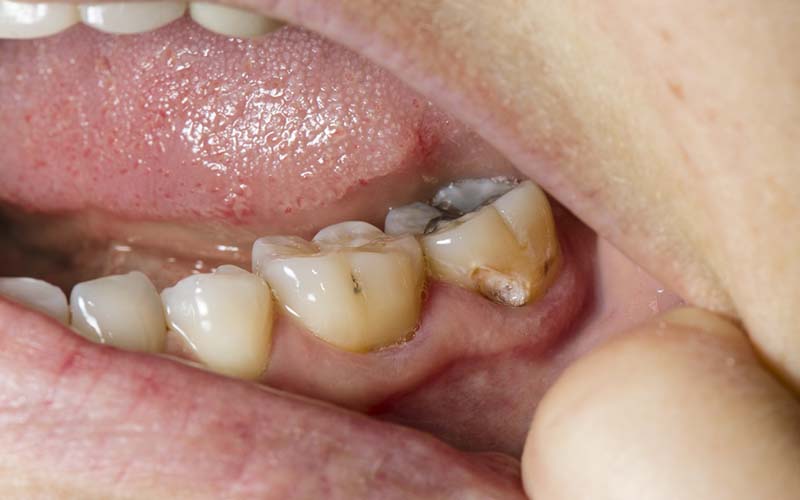Tooth decay, which is often referred to as cavities, can occur at any time. While children are more susceptible to developing cavities because of poor dental hygiene and eating habits, adults can just as easily develop tooth decay. When a cavity is smaller, it can be filled with composite resin material with no complications. However, when left untreated, the cavity will continue to infect the tooth, eventually reaching the pulp and requiring a root canal. As with most other health conditions, prevention is key to keeping your teeth and mouth healthy.
Here are 10 tips to follow that will help prevent cavities:
1. Brush Regularly Using the Right Technique and Brush
Dentists recommend that you brush twice a day for at least two minutes each time. When brushing your teeth, the toothbrush should be at a 45-degree angle and come into contact with both the tooth as well as the gums. This helps to remove debris, plaque, and particles from both the soft tissue and the teeth themselves.
When it comes to picking a toothbrush, many dental professionals will recommend using a power toothbrush, which often uses sonic vibrations or a rotating head to more effectively brush bacteria away. Try to stay away from hard bristle toothbrushes and avoid brushing too hard, as this can result in gum recession.
2. Floss Daily
Flossing is one of the most underutilized dental hygiene habits. A common problem that dental hygienists find is that their patients aren’t flossing their teeth. Flossing is the ideal way to keep the areas between your teeth clean and debris-free. There are many different types of floss options available, including string floss, flossing brushes, and water flossing devices. If you’re not used to flossing, it may feel like a chore in the beginning as you try to get used to it. However, the more that you floss, the more likely you’ll continue doing it and preventing cavities from forming between the teeth.
3. Use Mouthwash
Mouthwash contains bacteria-fighting ingredients that blast away leftover plaque, food, and germs while you rinse. Be sure to read the mouthwash label before using to ensure that you’re rinsing correctly. Most mouthwashes require you to swish a cap-full of liquid for at least 30 seconds. If the alcohol in your mouthwash burns and makes the experience uncomfortable, consider switching to an alcohol-free formula. Get in the habit of using mouthwash every time you brush your teeth for a cleaner mouth and fresh breath.
4. Avoid Sugary and Acidic Foods or Drinks
Bacteria in your mouth feed off sugar, which is the catalyst for developing tooth decay. The less sugar you consume, the less food the bacteria has to feed on and the less likely you’ll be to develop cavities. The same can be said of acidic foods and beverages. Overall, there are certain foods and drinks that are bad for your teeth and should be avoided.
For adults, this means less snacking and making healthier choices throughout the day. For kids, it means avoiding candies, sweet pastries and sugar-laden beverages that are consumed regularly. If you just can’t give up your sugary goodness, rinsing your mouth with water after eating or drinking can help wash away the sugar and acids.
5. Watch What You Eat Before Bed
Let’s face it, many of us are nighttime snackers. We like to get in bed at night and curl up with a good book or watch our favorite shows with a sugary snack or hot, sweetened beverage. The problem comes when you go to bed soon after eating or drinking without brushing your teeth again. Try to get in the habit of brushing your teeth immediately before going to bed and after you’ve done your nighttime snacking.
6. Consider Fluoride Treatments
Fluoride treatments help to strengthen teeth and prevent tooth decay. There are many fluoride options available to you. In many cases, the water that comes out of your faucets at home contains fluoride. If it doesn’t, be sure to use a fluoride toothpaste that is meant to prevent tooth decay. Your dentist will also have fluoride treatment available that takes just minutes to complete in-office and works to strengthen and protect your smile.
7. Think About Sealants
Tooth-colored or clear sealants can be brushed onto the biting surfaces of your teeth to prevent tooth decay and strengthen the teeth. The sealant is then hardened into place using a curing light and can last for about one to three years. Sealants act as a barrier between the bacteria in your mouth and the surface of the tooth. These sealants can help to prevent tooth decay and the need for subsequent fillings.
8. Go for Regular Dental Cleanings and Exams
Your first line of defense against serious tooth decay and cavities is to spot them before they’re allowed to get worse. In some cases, routine teeth cleanings can help to prevent cavities by getting rid of the buildup on your teeth that would otherwise create decay. It’s essential to visit the dentist twice a year for a bi-annual cleaning and examination.
9. Follow Your Dentist’s Recommendations
Your dentist will often give you advice and recommendations to take better care of your teeth. This might involve product recommendations, technique advice and important care instructions on how to brush or floss your teeth if you wear braces or have crowns, bridgework, or veneers. If you have periodontal disease, you may need special treatment that can help with treating your gums as well as reducing the chance of decay.
By following your dentist’s recommendations, you’ll be able to clean your teeth properly, avoid cavities, and find that your teeth are cleaner and healthier as a result. To make the most of your dental checkups, be sure to ask your dentist the right questions so you can better care for your teeth at home.
10. Seek Treatment for Dental Emergencies Immediately
If you have tooth pain or are experiencing a dental emergency, make sure that you call your dental office and schedule an appointment right away. In many cases, an untreated dental emergency can lead to severe tooth decay if you do not seek treatment as soon as possible. Smaller cavities often do not hurt, but you may experience sensitivity of the area or have slight pain as the decay gets deeper and reaches the pulp.
When you take the time to take care of your teeth, you’ll find that your dental appointments go smoothly and you develop fewer cavities. By preventing tooth decay, you’ll be able to avoid the need for dental fillings, root canals, and more costly dental procedures. Don’t fall for dental myths and assume you don’t need to see your dentist. If it’s been a while since you’ve visited the dentist, it’s never too late to begin treatment to take better care of your smile.

